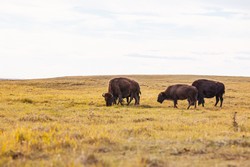Better soil food web models
The SOBIGLOBIC (Matching soil biodiversity with global biogeochemical cycles) project was established to improve the predictive ability of terrestrial biogeochemical cycle models by modelling the effects of soil food webs on carbon (C) and nitrogen (N) mineralization. Researchers first improved the model of the soil food web of a semi-arid prairie by including data from the whole soil biota and different (fast and slow) pools of soil organic matter. Scientists sampled a number of grazed and non-grazed sites and analysed the samples to determine the abundance of all functional groups of the soil biota and soil organic matter content. The resulting data were used to load the improved model and to simulate effects of grazing on soil food web stability. The soil samples were also incubated and analysed for different forms of C and N. The resulting data were applied to the latest version of the soil web model to simulate C and N mineralization by the soil biota under different grazing regimes. An investigation was also carried out into whether soil food webs of grazed and non-grazed semi-arid grasslands differ according to their resilience to climate change, particularly to increasing drought duration. This was tested with a year-long greenhouse experiment, which exposed soil columns from the field site to simulated rainfall patterns. These represented the current rainfall regime and the most likely future regime (according to climate change models), consisting of annual rainfall concentration in fewer but larger rain events. The same model used to test the effects of grazing was then used to determine the effects of interaction between grazing intensity and rainfall regime on soil organic matter mineralization by the soil food web and on soil food web stability. SOBIGLOBIC results will benefit policymakers, scientists, farmers, forest managers and local communities in the search for nature-based adaptive solutions to societal challenges derived from climate change.



